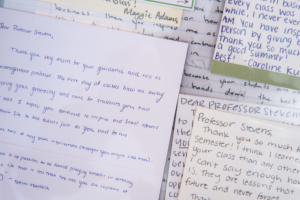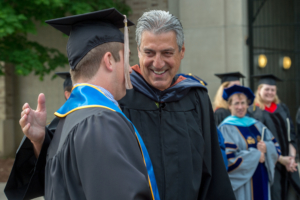When you talk to University of Notre Dame’s Chris Stevens, it becomes crystal clear why students adore him as a professor. Somewhere between the booming — yet distinctly calm — voice and his words that seem carefully chosen so that he can deliberately leave you feeling inspired, the Mendoza College of Business professor is the walking epitome of the phrase “positive vibes only.” The adjunct professor of management oozes with positivity and enthusiasm that become contagious within moments of coming into contact with him.
Professor Stevens, a 1974 graduate of Notre Dame, returned to campus to teach after four decades as a successful businessman. But he’s not just any businessman. Stevens helped develop and launch an innovation of single serve coffee options better known today as Keurig. He was one of three original founders to launch the product back in 1996. When the company was bought out and its new owners sought to pursue more long-term growth, Stevens stayed on as head of sales, overseeing all of Keurig’s sales, marketing, and branding strategies.
‘EVERYONE WANTS TO TAKE PROFESSOR STEVENS’
After what he calls a “good run” in business, Stevens returned to Notre Dame in 2013 because he wanted to do two things: “Help students to not make the same stupid mistakes I made and to follow their dreams,” he says.
However, “Be careful what you wish for,” says Stevens who became a full-time Mendoza faculty member in last year. In other words, you just might get your wish and then some. His mission to help students follow their dreams and avoid the pitfalls of leadership has made him one of Mendoza’s most popular professors. Since joining Mendoza, he has taught undergrads, MBAs, executive MBAs, and in the university’s ESTEEM program (Engineering, Science, and Technology Entrepreneurship Excellence Master’s). This semester, he’s teaching two sections of a Principles of Management course, with over one hundred students enrolled in each. For a professor like Stevens who puts his all into impacting each student individually, teaching this many students at once is no small feat.
But the desire to be inspired is not all it takes for hundreds of students to rush to sign up for a course. Students say he brings an authenticity and sincerity to the job and that’s what makes him so highly favored.
“Everyone wants to take Professor Stevens. He’s one of the most popular professors on campus,” says Ryan Kempin, a sophomore currently taking the Principles of Management course. “He really has a vested interest in each student’s life. On the first day of class, he knew every kid’s name without meeting them before and their hometowns. It’s really incredible. He’s a professor, for sure, but he’s also a friend.”
So how does he do it? Well, knowing everyone’s names and faces on the first day of class comes from their first assignment — due two weeks before class starts.
A FIRST DAY OF CLASS TO REMEMBER
“The sooner I can get to know the students, the better. Whether it’s a master’s class of 30 or an undergraduate course with 125 students in each class, it’s important — right from the get-go — to let them know I care about them,” Stevens explains. “So, I say, ‘Tell me about you, your goals, your dreams, your passions.’ They talk to me. I try to memorize their faces and names. Then on the first day, I throw all of their faces up on the board. It kind of freaks some of them out, but overall I think they enjoy it.”
Every student also gets a gift on the first day. “It’s a book called 5: Where Will You Be Five Years from Today? by Dan Zadra,” Stevens says. “When I was in college, I didn’t know where I wanted to be in five minutes. I try to get them to think about the direction their headed and where they aspire to go. So at the end of the first day of class I give them that gift.”
It’s also what takes place beyond the first day that makes Stevens such a sought after professor in the business college. Besides memorizing names and handing out books of inspiration, he indulges in other unconventional teaching methods that all revolve around ethical and kind leadership.
One such break from the mold is class service days. The night before a class is scheduled to meet, students get a surprise in their email inboxes instructing them not to come to class, but instead to go out into the community and to help someone.
“Kids go around and pick up trash, make food for their dorm, drive around and give food to those who may be homeless, or they have an interaction right on the street corner with someone like Daniel,” Stevens says. Daniel is a local well-known developmentally disabled man who regularly positions himself at a street corner a few miles away from campus.
“They write a paragraph of what they did and the experience becomes part of who they are,” Stevens continues.
Another way he inspires good works is to have students raise money for a person or organizational cause. Currently, students are crowdfunding for a 15-year-old survivor of the Marjory Stoneman Douglas High School shooting in Florida.
‘BEING A GREAT LEADER IS NEVER ABOUT YOU’
In essence, ethical leadership is a way of life for Stevens. He uses his experiences from the business world — good and bad — to impart it on his students.
“My first experience in business was with Proctor and Gamble in sales where there was great leadership and structure in place. I learned from that,” Stevens says. “Then, when I was president of Anheuser-Busch, I was placed in a position negotiating with labor unions. Because management hadn’t treated unionized workers like other employees, I was entering into a hostile environment. Helping them feel included and turning it around was key to my role there.
“What I try to teach students is that being a great leader is never about you, it’s about building an organization because it’s the organization that builds the business.”
Another one of Stevens’ most popular mantras is that business creates the wealth of the world, but that there’s more to the world than wealth.
“Professor Stevens teaches us that business creates wealth of world and we can use it to enrich the world — to use it for greater good,” Kempin says. “Business isn’t just the greedy line of work with the negative connotation that people typically think of — big CEOS with huge payouts and things like that.
“I guess it’s technically a management class we’re in,” Kempin continues. “But he’s trying to make us the best leaders possible so we can go into the real world holding corporate positions and making decisions.”
A BASKETBALL STAR’S RETURN TO NOTRE DAME
Stevens says it’s been nothing but fulfilling to return to Notre Dame where he studied economics and played basketball (during his senior year, he played on the team that put an end to an 88-game winning streak held by Notre Dame’s rival UCLA).
The results of being a friend, professor, and even sometimes a sounding board for students’ entrepreneurial ideas has left a lasting imprint on many. From handwritten thank-you notes to jumping out of line for hugs during graduation, students’ gratitude is one of the many rewards Stevens is now reaping as a business school instructor.
He also speaks highly of the Notre Dame and Mendoza community as a whole. “Being with the other faculty members here, I’ve learned so much from them,” Stevens says. “There are people from all backgrounds; some industry, some education, some both. To be back on campus and interact with them is such a thrill for me.
“I’m blessed to have a chair in Craig Crossland and co-chair Wendy Angst. They are true leaders,” continues Stevens. “The chair sends out a weekly note related to accomplishments within the management department, he gathers people socially. That’s what great leaders do. It’s all about trust.”
Stevens is also proud to be co-leading a new effort on campus called the Inspired Leadership Initiative, a one-year program to help retired and accomplished leaders to discern inspiration for their next phase in life.
While he isn’t too fond of the grading aspect of professorship (says grading should be pass/fail instead of labeling students with letter grades), Stevens says the Notre Dame experience is not much different than when he was a student.
“Opportunities and facilities are greater than back in those days and the university has invested heavily in becoming one of the greater forces for good around the world, but it’s the same place in terms of value and quality of people,” Stevens says. “It’s only different because of resources.”
DON’T MISS: MENDOZA STUDENTS CROWDFUND FOR FLORIDA SHOOTING VICTIM and POETS&QUANTS’ TOP 40 UNDERGRADUATE BUSINESS PROFESSORS














Questions about this article? Email us or leave a comment below.